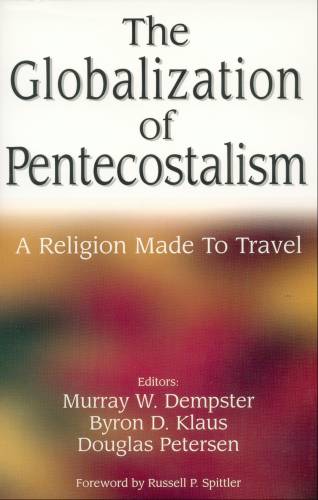The Globalization of Pentecostalism: A Review Article, by Paul Elbert
 Murray W. Dempster, Byron D. Klaus, and Douglas Peterson (eds.), The Globalization of Pentecostalism: A Religion Made to Travel (Irvine, CA: Regnum International, 1999), ISBN 9781870345293.
Murray W. Dempster, Byron D. Klaus, and Douglas Peterson (eds.), The Globalization of Pentecostalism: A Religion Made to Travel (Irvine, CA: Regnum International, 1999), ISBN 9781870345293.
This guest review essay originally appeared in Trinity Journal and is reprinted here by permission of the author.
This work[1] is the result of a conference in Costa Rica (1996) devoted to a selection of issues emerging from the ongoing globalization of what Presbyterian theologian J. Rodman Williams identifies as the Pentecostal Reformation,[2] a movement which represents more than one third of the world’s practicing Christians, more than all of Protestantism combined. In Williams’ case, for example, his many writings,[3] especially his trilogy, Renewal Theology,[4] have been of some assistance to the global Pentecostal and Charismatic renewal movements as have the biblical contributions, for example, of Arrington, Ervin, Horton, Palma and Rea[5] from within the Pentecostal sector. These movements[6] continue to attempt to reach out to Christians in various denominations through conferences and symposia around the world, as is the case with the current effort of Dempster et al. The estimate that the Pentecostal and Neo-Pentecostal movements now numerically dwarf all Protestantism combined is probably a conservative numerical estimate by Baptist statistician David Barrett’s latest tabulation[7] and accords with the belief of travelling observers that there are over a million Pentecostal churches in villages, towns and cities across the world. Given the contributions of the Reformed/Evangelical and Catholic tradition to the Charismatic Renewal, joining Pentecostalism’s renewed emphasis on Scripture and experience in theological reflection and hermeneutics,[8] and to various former and ongoing dialogues with Pentecostals,[9] perhaps the fruits and outreach of this conference in Costa Rica, along with associated theological ramifications, may be of interest to readers of the Trinity Journal.
Dempster, Klaus, and Peterson have put together a collection of essays built around three pre-selected themes, somewhat similar in style to the earlier Charismatic Christianity as a Global Culture.[10] Here, the editors and conference organizers come from the disciplines of social ethics (Dempster) and missiology (Klaus and Peterson). The immensity and diversity of the Pentecostal movement and its burgeoning offspring, the international charismatic renewal (not considered in this volume), afford a wide possibility for scholarly consideration. Those topics chosen here reflect the concerns and interests of the conveners and are grouped into three categories: Changing Paradigms in Pentecostal Scholarly Reflection, Pentecostalism as a Global Culture, and Issues Facing Pentecostalism in a Postmodern World.
As a brief assessment cannot give due consideration to all the contributions, perhaps it is appropriate to focus on some of the highlights and lowlights, as well as some backgrounds, in an effort to provide an overall perspective of the volume. In the first category, Changing Paradigms, Wonsuk Ma, writes on “Biblical Studies in the Pentecostal Tradition: Yesterday, Today, and Tomorrow” (52-69). Noting that two thirds of the world’s people in the Third World are more open to the supernatural world enunciated in Scripture than in Western cultures, Ma points out that “The Pentecostal movement has long treasured Scripture. These ‘people of the Book’ have never questioned the authority of the written word” (54), citing some of the scholarly books and journals produced in the tradition. Use of biblical narrative is widespread and Ma seems to side with the critical interpretative methods that emphasize the legitimacy of employing narrative for doctrine and practice, “Though the use of narrative for constructive theological work and doctrinal formulation has been criticized from both within and without, narratives are still viewed by Pentecostals, not only as an effective, but also as an authentic means of communicating traditions and truths” (62).
Category: In Depth


